How Much Sugar Are You Really Consuming?
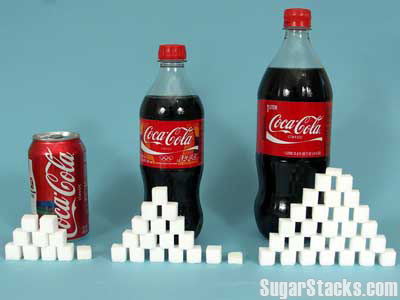
(Image courtesy of Sugar Stacks)
Ever wondered just how much sugar is in your favorite drink, snack or dessert? Wonder no more!
I just discovered the site Sugar Stacks today (hat tip to Local Nourishment), and was both appalled and thrilled to see such a vivid demonstration of the amount of sugar in a number of typical foods.
Just for fun (gosh, the things I do for fun!), here are a couple of other photos that I found particularly interesting:
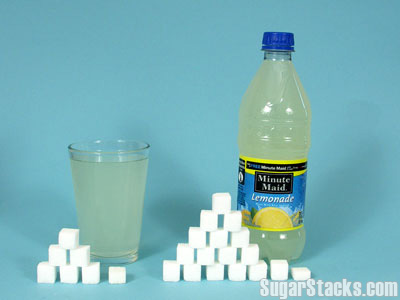
Lemonade? That harmless, refreshing summer beverage? 16 1/2 sugar cubes in one measly bottle! Let's squeeze some lemons, add a bit of honey, top it up with water and ice, and call that refreshment instead!
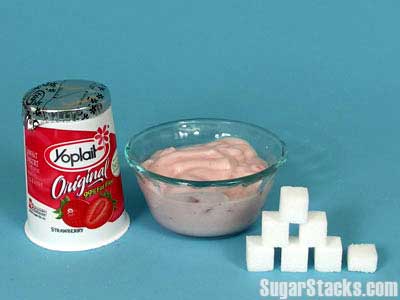
Ouch! 6 1/2 cubes of sugar inside each teeny tiny bowl of flavored, sweetened yogurt. Do yourself a favor and skip the flavored varieties. Buy (or make) plain yogurt instead, and add your own fresh or frozen fruit and perhaps a little natural sweetener of choice.
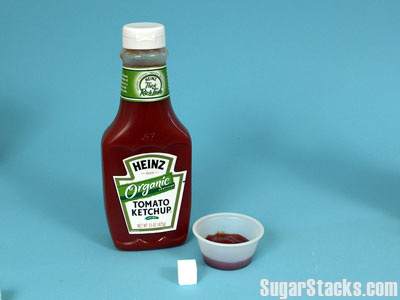
I know, this one may seem harmless in comparison. 1 cube of sugar. But… keep in mind that 1 cube is in each and every tablespoon of ketchup. A tablespoon is basically one decent sized squirt. Most ketchup lovers consume far more than that with their hashbrowns and eggs, their hamburger, or their french fries.
Wanna see some more? Check out SugarStacks.com for a whole host of examples of just how much sugar there is in processed, convenience and store-bought dessert or snack foods! It's a shocking reminder of the amount of sugar that members of our society pump into their bodies, and we wonder why such sickness and obesity abounds! And I'll confess… even I saw a couple of indulgences that I am sometimes tempted to enjoy and was so glad for the visual of exactly why I need to reconsider whenever those cravings arise!
Note: I will make one comment about an aspect of the site that I didn't care for or agree with. It's comparisons of the sugar in fruits and vegetables is highly inaccurate. Yes, there are naturally occuring sugars (ie. carbohydrates) in fruits and veggies. Yes, they do have some effect on our blood sugar levels. No, they are not even remotely the same thing as the added sugars (especially all the processed, white sugars and high fructose corn syrup) that are in most of the products they are displaying. Fruits and veggies contain high amounts of fiber, water, and vitamins and minerals. Our body handles them very differently than regular sugar. This is not comparing apples to apples, and I wouldn't suggest that you get hung up on this aspect of the site. Otherwise, enjoy!
Are you surprised to see this visualization of the sugar that is actually in some of these products? What is your biggest struggle in decreasing the sugar content of your diet?

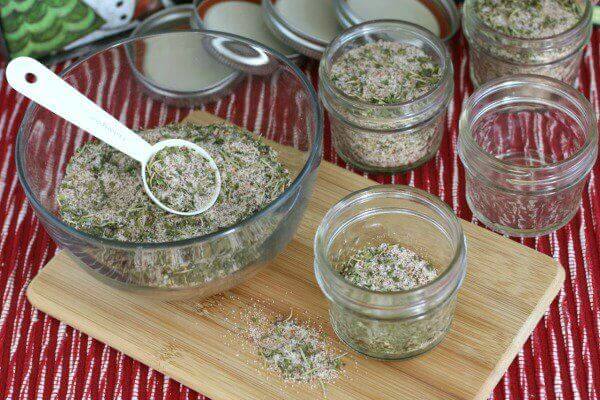

oh my gosh. i love you so very much! i haven’t even read this post yet and i’m excited. i’ve been on the path of providing more healthy options for my family for years. rarely will you find chips in our home, or store bought bags of cookies. we never have pop in our home. however, i am a coke girl. about two weeks ago i stopped. i just had one can or bottle per day that i would purchase daily. but i knew that was way too much sugar. and i stopped drinking it due to the sugar, dyes, chemicals. thanks so much for being an amazing inspiration to me!
I suppose i knew this, but it is a good reminder.
However, one major difference is that most of these products do not contain sugar, per se, but HFCS, which is much worse. This amount of sugar is very hard on our systems, but our bodies do not know how to handle the highly processed High Fructose Corn Syrup & that is behind many of our health issues in this country.
This is a timely post for me – I’m on day 5 of a sugar free week/two weeks/three weeks (depending on how it goes – I’m taking one week at a time). I’m on day 5 today, and I found yesterday really tough. Not as many cravings as day 3, but some serious withdrawal symptoms. Just strengthens my resolve, though – I don’t want to NEED sugar in my life!
Kathryn, that’s a totally valid comment about the High Fructose Corn Syrup in the products. It is absolutely worse than sugar (although the other processed sugars are still incredibly bad for us, especially in the amounts in which we consume them), and it is a huge issue! I bring it up every now and then, because it’s important that people know to avoid it, so thanks for mentioning it in this context! 🙂
I love this post! A great visual for my kids regarding sugar. We quit using white table sugar several years ago, but it took about a year to wean my kids off of it. I pretty much did it cold turkey, but that was easier because I was convinced of the health benefits of not eating so much. I eased my kids off and “re-educated” them because I wanted them to buy in to it so that it was a lifestyle change that would stick with them. They still want sugary items, but now I hear things like “Mom, do I have to eat this cake? It’s too sweet and sugary.” Blesses my soul to hear them talk like that! Now we save sugary treats for once a week, usually on a Sunday when we are celebrating (Christ is risen!) and “eating the fat of the Land” as I like to tell my kids, or at a party on Saturdays.
A thought on the “sugar” in fruits and vegetables. A friend who is a physician shared with me that apple seeds when removed are what make arsenic. But when eaten with the flesh of the apple, are harmless (please verify if you are interested). He said that God had perfectly balanced the fruits and vegetables and I am thinking that the “sugars” in them is balanced properly as well. It is a healthy sweet treat that we can enjoy!
WOW! I guess I like to not think about how much sugar might be in something…thanks for sharing this link!
~Wonderful post Stephanie. 🙂
Thank you for sharing this info.
I had no idea about yogurt. Yikes!
Interesting. Myself, I don’t eat any processed sugars at all…haven’t in many years. I regained much of my health issues from eliminating it. It was really hard to do. But then I started to taste the real tastes in food…its incredible how good and sweet things like even some vegetables can be.
I’m still working on switching over my husband. I provide very little that is made with processed sugar. Its harder though since he gets given a lot of sugary gifts, and there are always “goodies” around work in the lunch room. He doesn’t share my ideas quite as much. I also am at the point now where my oldest is getting things offered to her without me being right there (like at church…its absolutely awful how much sugar people eat at church, especially the “coffee time”.) Most people know where I stand but I need to educate her with time so that she will then make her own choices…and I will have to cope with whatever she ulimately decides. Thats a tough one.
Just a word on the natural sugars in fruit and vegetables. Natural sugars and those found in honey do raise insulin levels in the body in the same way as other sugars, though as you say, not necessarily to the same degree. A more helpful way to view info on fruits and vegies may be this site (Australian Based) http://www.glycemicindex.com/
This gives a bit more of an insight into the way the body metabolises sugars.
Great post. I think we know this but visualizing it really hits home. And it never hurts to keep hearing this stuff. Thanks!
I think our biggest struggle is avoiding sugar when we leave our home. We’ve switched over to sucanat at home and it has really made a difference in how we feel. I mean, between church events, family events, work parties, and such, it can be really hard! Especially places where the water tastes less-than-filtered, but being down south the only other option is sweet tea! And then, during parts of the year when you’re eating with others so much more (like months with high birthday concentrations), I just get so used to having sugar that I actually go out of my way to bring sugary things home.
But the biggest helper in avoiding sugar has been sort of a bait and switch. If I really want ice cream, I’ll hit the blender with some fruits and make a smoothie instead. That has been really helpful.
Great comment, Glenda! The lof fruiate great Dr. Atkins wondered how fruit got such a great reputation. Even sweet fruits and starchy veggies should be treats in our diets. Sugar is sugar, whether it’s refined, comes in the form of a “natural” sweetener, or is paired with water and fiber in the form of fruit. It raises insulin (glucose) and causes your liver to produce triglycerides, triggering fat storage (fructose). Guess the vast majority of Americans have much bigger problems than overconsumption of fruit, though!
I recently read that even Agave Nectar is bad for you. Something about the way it’s processed makes it like High Fructose Corn Syrup or even worse. Do have any light to shed on this?
@Julie, I haven’t looked into it really deeply, but I have also read that there are issues with the processing and that it makes it not such a great choice for a natural sweetener. Personally, I don’t use it.
This is a very timely article! I just found sucanat in the bulk bins at our local coop, and I’ve been pricing it against regular white sugar. While it’s more expensive, honestly it still seems pretty inexpensive to me. Especially since i don’t use sugar that often.
I’ve been subbing honey a lot lately, and I have some blackstrap molasses too, although I’ve yet to break that out and actually use it (I think I’m a little intimidated by it). I know those things still contain plenty of sugar, but if I understand correctly, there’s beneficial elements too.
So, thanks for the encouragement to leave sugar behind! I do pretty well, but last night drank a can of Coke on a whim (wasn’t even that satisfying to be honest) and gulped when I saw how many sugar cubes were in it.
Now if I could wean hubby off the ice cream habit… 🙂